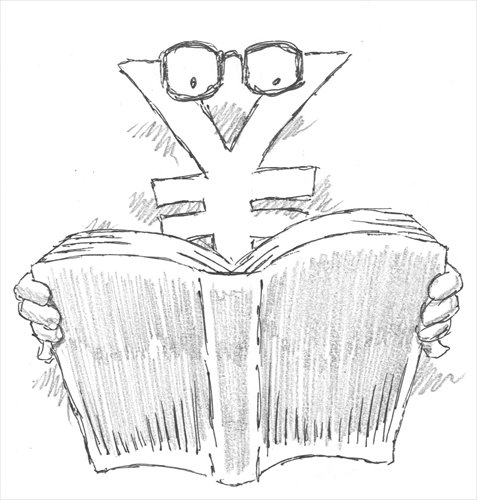Nerdy slang becomes pivot of education arguments

Illustration: Peter C. Espina/GT
Nerds and bookworms in China are having their day. A new slang term called "xueba," which literally translates to "academic guru," has been spreading on the Chinese Internet for over a year. The term is used to label students who study all the time and have outstanding academic performances.
Most xueba are prominent students at Chinese top universities, top scorers at the national college entrance examinations, and a handful of students who are favored by world first-class universities.
They have staggering academic achievements or experiences that most of their peers can only dream of. Xueba are even becoming a new icon, like movie and sports stars, for the younger generations.
However, the high reputation that xueba have earned means pleasure as well as pressure, as there are always skeptics throwing questions. This term now has many cultural and educational connotations that were probably never anticipated when it was coined.
High schools that have cultivated extraordinary numbers of xueba, which means they have many more students who can go to top-notch universities than other schools, are being condemned because some people, especially education experts, believe their achievements are the results of a highly centralized system of educational resources distribution.
The best teachers and facilities are deliberately allocated to some certain schools so that more xueba can be "produced." It seems that this originally complimentary term is now connected with China's long-standing problem of educational inequality.
What's more, encouraging students to follow these examples is discouraged by some experts. This is another round in the long-standing grudge match between exam-oriented education and essential-qualities-oriented education.
Triggering a public debate in China is not the end of the xueba effect. Smart and hardworking Chinese students are also an international concern.
According to the latest report of the Program for International Student Assessment (PISA), a worldwide study of a number of nations to assess their 15-year-old school pupils' scholastic performance on math, science and reading, students in Shanghai ranked the first once again for two consecutive years.
Of course, Shanghai is one of the richest areas in China, and its education spending per capita is four times the national average. And there are serious questions about whether migrant children have been excluded from the PISA study.
But some Western countries, most of which are ranked in the middle or even rear and are apparently unable to understand the difference between a city and a country, become paranoid over the belief that "China" has outperformed them in education.
On February 17, the Telegraph even published an article, claiming that "China's" poorest kids of factory workers and cleaners were beating the offspring of UK lawyers and doctors.
Domestically, it is not very persuasive to label xueba as the product of exam-oriented education or a centralized distribution system of education resources.
In most cases, the academic achievements made by these leading examples do not come from rote learning, but a comprehensive package of intelligence and hardworking.
As for educators and media, it is unhelpful to go for or against xueba, because it's not a case of all or nothing.
It will be more constructive if they consider the phenomenon objectively by bringing out the cream of their spirit, such as scientific time management and effective reading skills, and filtering out the negative elements, if any, such as rote learning.
The author is a reporter with the Global Times. liuzhun@globaltimes.com.cn